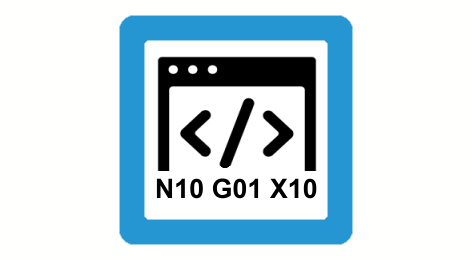Updating the Volumetric Compensation
Volumetric Compensation is updated by the NC command #VOLCOMP[UPDATE] or by CNC objects.
By entering the keyword UPDATE in the NC command, the parameters are reloaded from the configured files. However, the related compensation must first be deactivated.
An update also includes the configuration from the compensation lists (participating axes, kinematic chain etc.) in addition to the error parameters.
Before an update, the compensation is implicitly deactivated, as required.
Programing Example

Reload parameters to the NC program
; Deactivate compensation
; …
N090 #VOLCOMP OFF [ID0]
; Update compensation parameters
N100 #VOLCOMP [ID0 UPDATE]
; Reactivate compensation
N110 #VOLCOMP ON [ID0]
; …
Updating by CNC objects
Alternatively, Volumetric Compensation can be updated by CNC objects.
To achieve this, the configuration file and the associated compensation lists must be accessible on the file system Virtual file systems in controller configurations (e.g. tc_virtual_*\*) are not accessible.
Example

Configuration file on file system, C:\vc\volcomp1.lis
workpiece_axes 0
X 1
Y 2
Z 3
Interpolation GRID
enable_splicing FALSE
filter_steps 20
manual_activation FALSE
alternative_model FALSE
associate_to_channel FALSE
file[0] C:\vc\volcomp1.csv
file_format[0] ISG_CSV
Example

Compensation file on file system, C:\vc\volcomp1.csv
X Y Z EXX EYY
0 0 0 0.000 0.000
0 5 0 0.001 0.001
0 10 0 0.002 0.002
0 15 0 0.003 0.003
0 20 0 0.004 0.004
0 25 0 0.005 0.005
0 30 0 0.006 0.006
0 35 0 0.007 0.007
0 40 0 0.008 0.008
…
The process is then as follows:
- The ID is first written to cnc_interpr_vol_comp_index_w, for example ID=0
cnc_interpr_vol_comp_index_w = 0 - Then the path of the configuration file is written to cnc_interpr_vol_comp_file_w, for example:
cnc_interpr_vol_comp_file_w = C:\vc\volcomp1.lis
The second write operation triggers the update. After updating, the compensation can be re-enabled.
Updating does not change the CNC configuration, i.e. at the next controller start-up, the previous original data is again active.